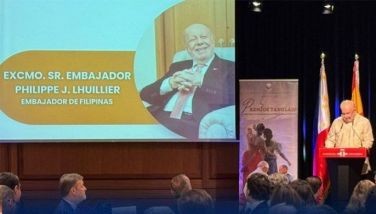Laundromat

How much cash can fit into a flight check-in luggage? Packed tightly, perhaps up to $2 million, as surmised by certain senators in the course of a probe into anomalies at the Ninoy Aquino International Airport.
Can such large wads of cash be brought into the country without being detected?
They can – if the luggage is escorted by authorities so it can be waved through airport Customs. And they have – one passenger brought $4 million in one flight.
“Authorities” – as the Senate Blue Ribbon committee has been told – can be members of the Philippine National Police, Armed Forces of the Philippines or the Manila International Airport Authority police. Of course the PNP, AFP or MIAA police escorts can be held liable for currency smuggling and graft.
Or the cash can be declared – as required in that Customs form that all arriving international travelers must fill out – for any foreign currency amount higher than $10,000.
If declared, the bearer of the cash must state the source of the money and the reason it is being brought into the country, in this age of paperless financial transactions.
The passenger can declare that he’s a casino high roller, in which case the declared cash may not be seized outright, according to Blue Ribbon chairman Richard Gordon.
But alarm bells should ring, Gordon stresses, if such large cash movements are done several times over the course of just a few months by only a few individuals. The government should monitor the regular passenger, he says, to verify if indeed the money is spent in casinos.
* * *
How much of the cash is actually placed on bets is significant, since senators have established that the gaming facilities are among the best Laundromats for dirty money. Buy $1 million worth of chips, bet $10,000. Win or lose, cash in the chips and get a receipt, and the money, no matter how dirty, is washed. With a cooperative cashier, all the money can be declared as winnings.
No one, even in Hollywood movies, however, can enjoy a months-long winning streak, Gordon points out. The Anti-Money Laundering Council (AMLC), he says, should have been sufficiently alarmed to conduct a probe in the case, for example, of a family surnamed Rodriguez, whose legitimate business appears to be the local distribution of the pricey Usana line of US-made health supplements.
The Rodriguez family members, who are not in politics, failed to appear at the last hearing of the Blue Ribbon on anomalies at the airport. Gordon told “The Chiefs” last week on Cignal TV’s One News that the family members have promised to appear at the next hearing this week, before Congress adjourns from March 14 to May 3.
Between September 2019 until February this year, Gordon said at the Senate, just 47 individuals brought in a whopping $447 million into the country through airport Customs.
Gordon said Chinese nationals accounted for 46.98 percent of the money. The common reason given was that the passengers were headed for the casinos. But casinos are already covered by the probe powers of the AMLC.
The Rodriguez family, Gordon said, had an inordinate share of the total. When a certain Simon Rodriguez was caught in September last year for failure to declare the huge amount, subsequent piles of cash were brought in by his relatives in smaller amounts, Gordon said. A certain John Joshua Rodriguez brought amounts ranging from $400,000 to $1.5 million. That’s still about P20 million to about P75 million, brought through the NAIA over just a few months. Didn’t alarm bells ring in the AMLC?
* * *
The AMLC, however, isn’t the only institution sitting on its butt when it comes to going after money laundering. The Philippines in fact may land in the gray list of the Asia/Pacific Group on Money Laundering if the country fails to broaden by this October the powers of the AMLC, to include tax offenses and terrorism financing among its covered crimes, and real estate brokers among covered persons. There are proposals to give the AMLC subpoena and contempt powers.
For a long time now, the Department of Finance has also been pushing for the easing of bank secrecy laws in cases of tax evasion and money laundering.
Even Gordon, however, argues that this could scare away money from the Philippines – although he stressed to The Chiefs that he would not oppose such a measure, if the ways and means committee would work on it.
That’s a pretty big IF. A number of the most accomplished tax evaders, money launderers and racketeers are in Congress. They would do everything to keep the AMLC out of their rackets.
* * *
One of the best ways, in fact, of laundering dirty money in this country is campaign finance. The Commission on Elections is toothless in enforcing caps on campaign spending and monitoring contributions.
Jueteng lords, smugglers and drug traffickers contribute to political campaigns – and buy influence in the process. In the case of one notorious drug dealer, his campaign contribution has even managed to buy him his continuing safety from Double Barrel and freedom from detention without bail.
Other criminals don’t bother contributing to campaigns, but enter politics themselves. If they win, they get the best of both worlds – political power with all the perks that go with that in this country, plus protection for the continuation of their lucrative criminal activities. Politicians have also been linked to carjacking, ransom kidnapping, gunrunning and robberies of banks and armored vans.
Ineffectual campaign finance rules combined with tough bank secrecy laws make election campaigns the most extensive and efficient Laundromat in this country.
The laundering isn’t new. I’ve been told that as far back as pre-martial law days, then Manila mayor Antonio Villegas put a police tail on his political opponent during one campaign. The cops found out that supporters of the opponent would wait at the Philippine Charity Sweepstakes Office for winners to arrive, and offer to buy the winning tickets at higher rates. The supporters then collected the winnings, with receipts to show where the money came from. The cash could then be deposited in banks. It was a highly effective way of laundering unexplained wealth.
Now we have laundering through the casinos. A stronger regulatory environment should cure this. But if lawmakers wanted to introduce a cure, they would have done so decades ago.
- Latest
- Trending



























